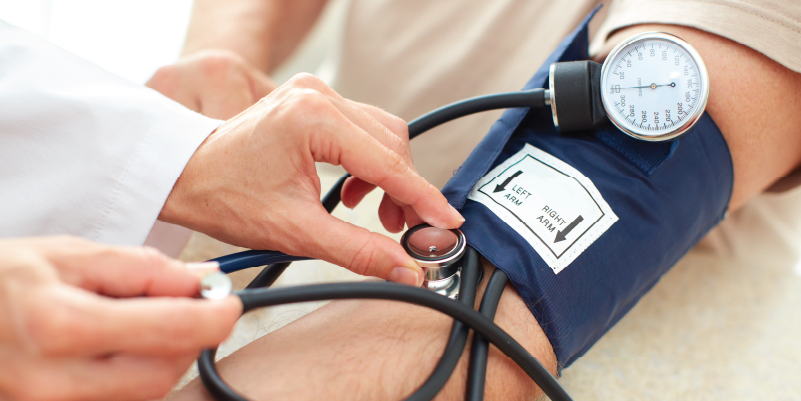When the body doesn’t receive enough fluids, we become dehydrated. Dehydration occurs when your body loses fluids faster than you can replace them or when you neglect to hydrate yourself throughout the day. Dehydration can be a serious concern, especially if left untreated. It can lead to life-threatening complications and contribute to dangerous changes in your blood pressure. You may ask, “Can dehydration cause high blood pressure?”
In this blog, we’ll take a look at the various symptoms of dehydration, its impacts on your blood pressure, and how you can practice hydration safety.
Dehydration and High Blood Pressure
Dehydration can play a role in developing high blood pressure, also known as hypertension. When the body is dehydrated, there is a decrease in blood volume, which triggers the release of hormones such as vasopressin and aldosterone. These hormones cause the blood vessels to constrict and the kidneys to retain more water, leading to an increase in blood pressure.
Additionally, when the body is dehydrated, it produces more angiotensin, a hormone that constricts blood vessels and raises blood pressure. Dehydration can also impair the function of the endothelium, the inner lining of blood vessels, affecting your ability to regulate blood pressure. Dehydration can contribute to the accumulation of sodium in the body, which can also elevate blood pressure.
Dehydration and Low Blood Pressure
Dehydration can often lead to low blood pressure or hypotension. When your body loses more fluids than it takes in due to inadequate water intake, excessive sweating, vomiting, or diarrhea, it disrupts the delicate balance of electrolytes and fluids in the body. As a result, the volume of blood circulating through the blood vessels decreases, causing a drop in blood pressure.
Additionally, dehydration affects the body’s ability to regulate blood pressure through constriction and dilation of blood vessels, as well as the release of hormones that help maintain proper blood flow.

Signs of Dehydration
Dehydration can easily go unnoticed if you’re not familiar with the common symptoms. Being able to recognize the signs of dehydration can help you keep yourself safe. Here are a few common signs of dehydration:
- Thirst: Feeling excessively thirsty is one of the earliest signs of dehydration.
- Dry mouth and sticky saliva: Decreased saliva production can lead to a dry, sticky feeling in the mouth.
- Fatigue and weakness: Dehydration can cause a lack of energy and general feelings of weakness.
- Dizziness or lightheadedness: Reduced fluid levels can affect blood pressure and lead to feelings of dizziness or faintness.
- Dark-colored urine: Dehydration often results in concentrated urine that appears darker than usual.
- Reduced urine output: Decreased fluid intake can lead to a decrease in the frequency and volume of urine.
- Dry skin: Dehydration can cause the skin to become dry, less elastic, and more prone to irritation.
- Headache: Dehydration can trigger headaches or exacerbate existing ones.
- Muscle cramps: Electrolyte imbalances resulting from dehydration can lead to muscle cramps or spasms.
- Rapid heartbeat: Dehydration can cause an increased heart rate or palpitations.
When to Seek Medical Attention
If you experience severe dehydration or any of the following conditions, it is recommended to seek immediate medical help. Firstly, if you cannot keep fluids down, such as persistent vomiting, it can worsen dehydration and necessitate medical intervention.
Secondly, if you have diarrhea that lasts for more than 24 hours, especially if it contains blood or is accompanied by severe abdominal pain, medical attention is necessary.
Thirdly, if you notice signs of severe dehydration, such as confusion, dizziness, rapid breathing or heart rate, or fainting, it is crucial to seek immediate medical care. Additionally, if you have a high fever, have been exposed to extreme heat, or cannot urinate for several hours, medical attention should be sought.
Finally, if you have a chronic illness, such as diabetes or kidney disease, and experience symptoms of dehydration, it is advisable to consult a healthcare professional for appropriate management. Seeking medical attention for severe dehydration is vital to prevent complications and ensure proper rehydration.

Your Neighbors Are Here To Help
When it comes to protecting yourself from overheating and dehydration, it’s crucial to inform yourself of the common symptoms before you encounter life-threatening complications, like drastic blood pressure changes. Our answer to “Can high blood pressure cause high blood pressure?” would be yes, and there are ways to keep yourself hydrated and healthy!
However, we understand that emergencies can still happen, and they can occur when you least expect them. That’s why you can rely on Neighbors Emergency Center to provide the elevated care you deserve when you need it. Our board-certified team of physicians ensures you are in and out of our facilities in the best shape you can be.
Visit our locations for more information about how we can help you in your time of need!
